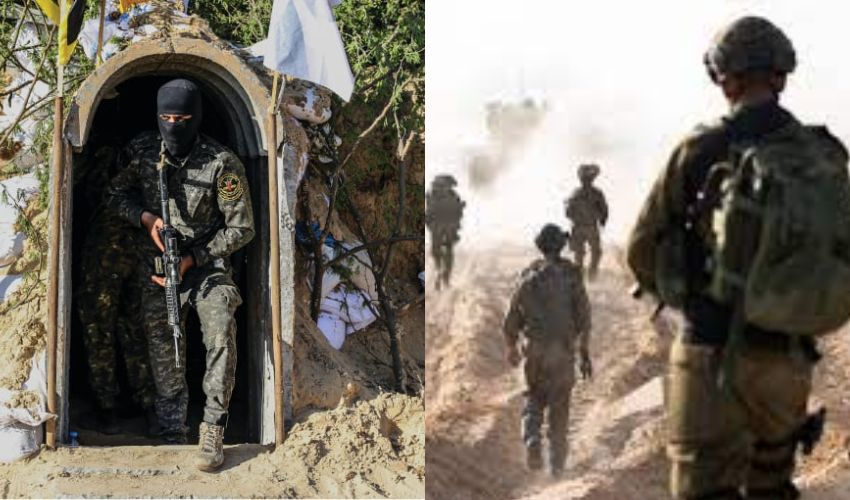Israelis and Palestinians end a dark year on Sunday, with no end in sight to the deadliest military offensive on Gaza, triggered by Hamas' bloodiest attack on Israel.
There has been no respite from Israel's air raids, artillery fire or ground fighting with Hamas in the Gaza Strip, to the despair of Palestinians surviving the onslaught.
"We were hoping that 2024 would arrive under better auspices and that we would be able to celebrate the New Year at home with our families," said Mahmoud Abou Shahma in a camp for displaced people in Rafah, on the Egyptian border.
"We hope that the war will end and that we will be able to return to our homes and live in peace", said the 33-year-old from southern Khan Yunis, an epicentre of the conflict.
Gaza's health ministry says the Israeli military campaign has killed at least 21,672 people, mostly women and children.
The fighting began with Hamas's bloody October 7 attacks, which left about 1,140 people dead in Israel, mostly civilians, according to an AFP tally based on official figures.
Militants also took about 250 people hostage, and Israel says 129 of them remain in captivity.
The Israeli army says 170 soldiers have been killed in combat inside Gaza.
An Israeli siege imposed after October 7, following years of crippling blockade, has led to dire shortages of food, safe water, fuel and medicine in Gaza, with aid convoys able to offer only sporadic relief.
The UN says more than 85 percent of Gaza's 2.4 million people have fled their homes.
Prime Minister Benjamin Netanyahu said Saturday that Israel's war against Hamas will last for "many months" -- until the Palestinian militant group has been eliminated.
"We will guarantee that Gaza will no longer pose a threat to Israel," he told a news conference.
- 'Every shred of hope' -
As Netanyahu spoke, more than a thousand relatives and supporters of the hostages demonstrated in Tel Aviv to maintain pressure on his government to bring their loved ones home.
"I hope there's going to be another deal, even a partial deal or some will be released. I'm trying to hold on to every shred of hope," said Nir Shafran, 45.
Gal Gilboa-Dalal has been traumatised since the rave he attended with his brother Guy was stormed by Hamas commandos on October 7.
"I was there with him and he was taken away the minute I wasn't with him. So I went with him and I came back without him and it's like time has stopped ever since," he said.
In southern Gaza's Khan Yunis, medics at Nasser hospital described severe shortages.
"The hospital is receiving a lot more (patients) than its capacity, in fact we are functioning at 300 percent of our... capacity," doctor Ahmad Abu Mustafa said in footage shared by the World Health Organization (WHO).
"The beds are full... and we are basically short on all sorts of medicine supplies."
The fighting has put 23 hospitals and 53 health centres out of service, while 104 ambulances have been destroyed, the health ministry said.
In central Gaza's Zawayda, Palestinians pulled the body of a child from under the rubble on Saturday after an Israeli strike.
"We pulled (out) nine martyrs, who were members of a very peaceful family. Two adjacent houses were targeted," said the area's civil defence director, Rami al-Aidi.
- Mediation efforts -
International mediators -- who last month brokered a one-week truce that saw more than 100 hostages released and some aid enter Gaza -- continue in their efforts to secure a new pause in fighting.
US news outlet Axios and Israeli website Ynet, both citing unnamed Israeli officials, reported that Qatari mediators had told Israel that Hamas was prepared to resume talks on new hostage releases in exchange for a ceasefire.
A Hamas delegation was in Cairo on Friday to discuss an Egyptian plan proposing renewable ceasefires, a staggered release of hostages for Palestinian prisoners, and ultimately an end to the war, sources close to Hamas said.
Islamic Jihad, another armed group fighting alongside Hamas, said on Saturday that Palestinian factions were "in the process" of evaluating the Egyptian proposal.
A response will come "within days", the group's chief negotiator, Muhammad al-Hindi, said.
Asked about the negotiations on Saturday, Netanyahu said Hamas had been "giving all kinds of ultimatums that we didn't accept".
"We are seeing a certain shift (but) I don't want to create an expectation."
- Fronts multiplying -
The Gaza war has intensified tensions across the region.
Yemen's Iran-backed Huthi rebels have repeatedly targeted vessels in the vital Red Sea shipping lane with strikes they say are in support of Palestinians in Gaza.
On Saturday, the US military said one of its destroyers shot down two anti-ship ballistic missiles fired from territory controlled by the rebels.
The US Central Command described it as the "23rd illegal attack by the Huthis on international shipping" since November 19.
Israel has also traded frequent cross-border fire with Lebanon's Iran-backed Hezbollah movement.
"We are striking hard against Hezbollah (...) and if Hezbollah wants to extend the war, it will be dealt blows like never before, and so will Iran", Netanyahu warned Saturday.
In Syria, at least 23 pro-Iran fighters -- five Syrians, four Hezbollah members, six Iraqis and eight Iranians -- were killed on Saturday in raids "likely" carried out by Israel, according to the Syrian Observatory for Human Rights.



























